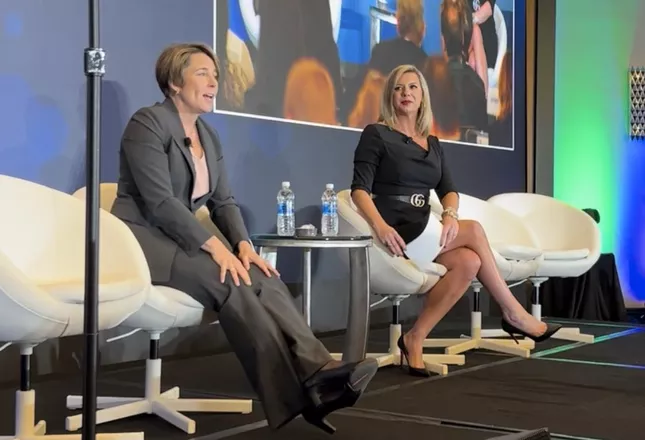
The following is an excerpt from a story that originally published to Bisnow on April 25, 2023.
While macroeconomic issues continue to strain the life sciences market, local problems have also begun to impact Massachusetts’ biotech sector, worrying state leaders about the future of its workforce.
Gov. Maura Healey and MassBio CEO Kendalle Burlin O’Connell said Tuesday morning that issues of housing affordability and narrow access to job opportunities have put pressure on the state’s biotech workforce. They said Massachusetts’ competitiveness might be on the line, but they have ideas on how to address the issues.
Gov. Maura Healey and MassBio CEO Kendalle Burlin O’Connell speak at the MassBio State of Possible Conference on Tuesday.
“Closer to home, we have major statewide threats to our economic viability,” Burlin O’Connell said at the organization’s State of Possible Conference Tuesday. “The high cost of living and doing business here, the crisis of both housing availability and affordability, and same with childcare.”
A major part of Healey’s campaign and proposed budget is to make Massachusetts a more affordable state to live in, especially to maintain its competitive edge as a leader in the biotech market, she said.
“One of the reasons we are so focused on housing is because we are not looking for excuses for people to leave,” Healey said. “I don’t want people not coming here. Again, there’s so much to commend Massachusetts, but if you can’t afford it, the calculus just does not work.”
As part of her $5.5B budget, Healey proposed $1B toward creating the Executive Office of Housing and Livable Communities, an office that would prioritize housing creation throughout the state.
Healey said that affordable housing isn’t the only way to stay at the forefront of the market. Being able to provide access to job opportunities to a wider net of residents will also help keep the state competitive.
Investment opportunities in gateway cities like Worcester and Lowell that have begun to slowly grow their own life sciences clusters and training programs like the MassBio Training Center in Beacon Capital Partners’ 750K SF Southline project in Dorchester are helping to bridge a gap in skills for underserved communities.
“It’s also about appreciating that this is something that can be statewide,” Healey said. “Stuff is happening in gateway cities, and part of our job is to make sure we are working with you, whether it’s opening up training facilities, R&D, manufacturing. Let’s seize that opportunity across the state.”